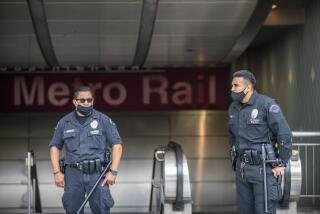‘Braking the RTD Monopoly
- Share via
Supervisor Schabarum raises some interesting issues regarding the Rapid Transit District, but he ends up advocating a “cure” that won’t do a thing to alleviate the situation he describes.
I’d suggest three more pertinent explanations for the RTD’s current difficulties.
One, can the RTD recruit the best-qualified highly motivated people to operate its buses? The hours are often segmented (enforced time off between rush hours), the work is boring and repetitive, and the customers are frequently impolite or downright hostile.
Two, simple logic suggests that the RTD only get full utilization out of its labor pool and its bus fleet for four rush hours per day; the rest of the day the entire organization is 80% idle.
Three, I’d submit that RTD’s board is under more pressure from the supervisors and mayors to maintain labor peace at any price than it is to clean up misdeeds among the drivers.
Schabarum says the RTD is “immune from the incentives that breed efficiency,” implying that, because it is a monopoly, RTD’s management allows excessive absenteeism. But isn’t it true that transit agencies are under the thumb of local government when it comes to labor relations--to the point where they might be overly generous when it comes to negotiating with the operating unions? Transit strike are as disruptive as refuse-hauler strikes, and local officials (including presumably, Schabarum) are always upset when a strike is a threat or an actuality. Who takes the heat to settle a transit strike?
Yes, a reduction in the tax subsidy now provided to RTD would be welcome, but handing parts of the RTD’s operating territory to a private operator will result in either an increase in taxes or the loss of marginal services. A private, non-union bus line may earn a better net on heavily traveled lines, but who is going to subsidize the less-demanded services?
Who will pay “Joe’s Bus Line” to operate at all hours? Who will pay for it to serve the boondocks? You know the answers, Pete--the same people who now pay for these services. Tax money will have to be spent to pay “Joe’s” to serve outlying areas, even if the private operator can make money on busy lines.
Schabarum’s concern with the RTD’s excessive labor costs can and should be solved by the negotiation of tougher work rules, not by throwing a monkey wrench into the present organization. A more direct cure can be found for absenteeism than asking the taxpayers to subsidize a private bus line.
Surely the chairman of the Board of Supervisors is better informed regarding the economics of public transit than he indicates in his article. If “privatization” could solve the RTD’s problems (or those of any other transit authority), wouldn’t there be hordes of would-be transit firms clamoring for a chance to prove it?
Finally, why should competition be useful to the transit customer? It is clear that most utilities serve the public best when they are organized as closely regulated monopolies. The more bus lines there are, the more complex and difficult it is for the transit-dependent to get from place to place. After all, service is what transit is all about, isn’t it?
JOSEPH A. STRAPAC
Huntington Beach
More to Read
Sign up for Essential California
The most important California stories and recommendations in your inbox every morning.
You may occasionally receive promotional content from the Los Angeles Times.













